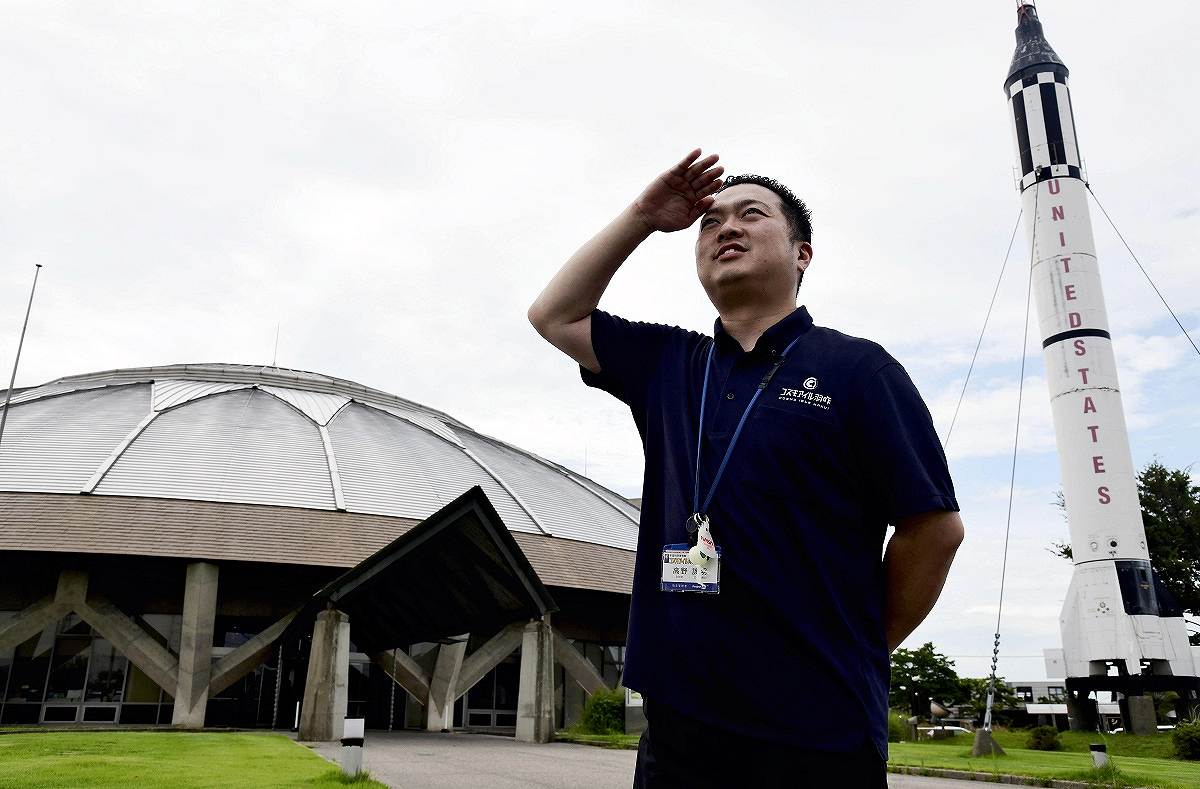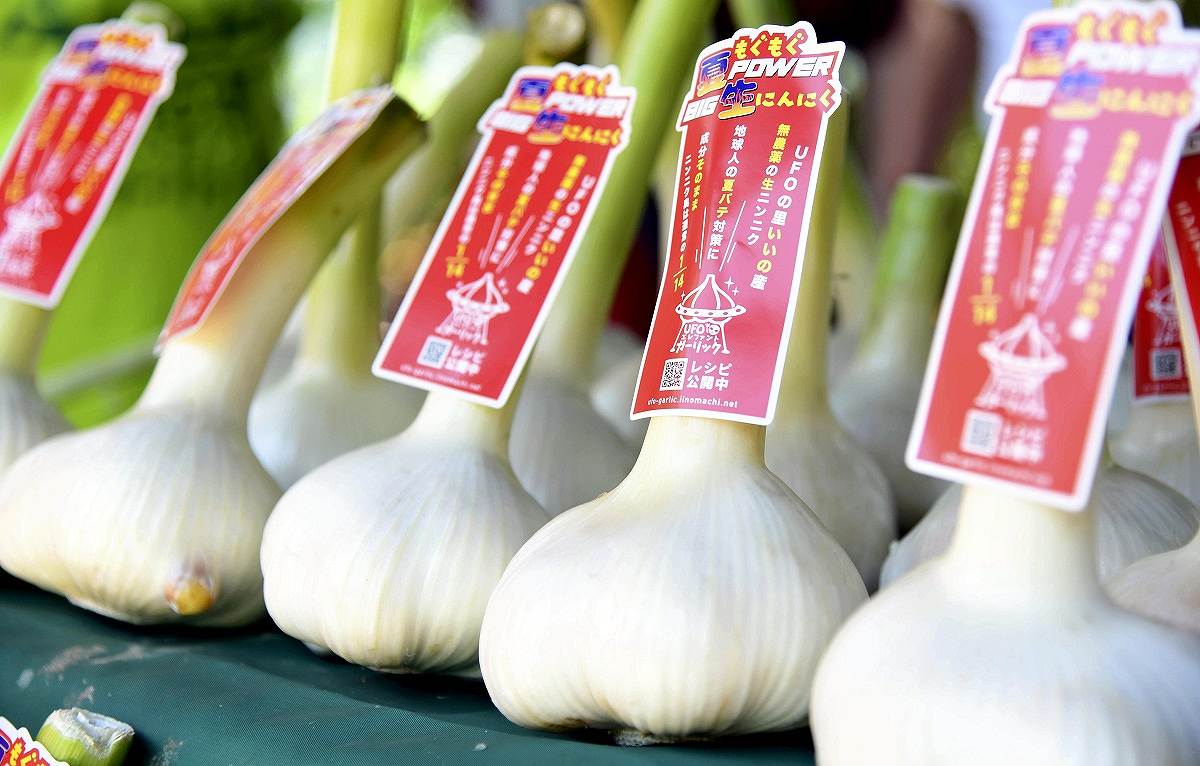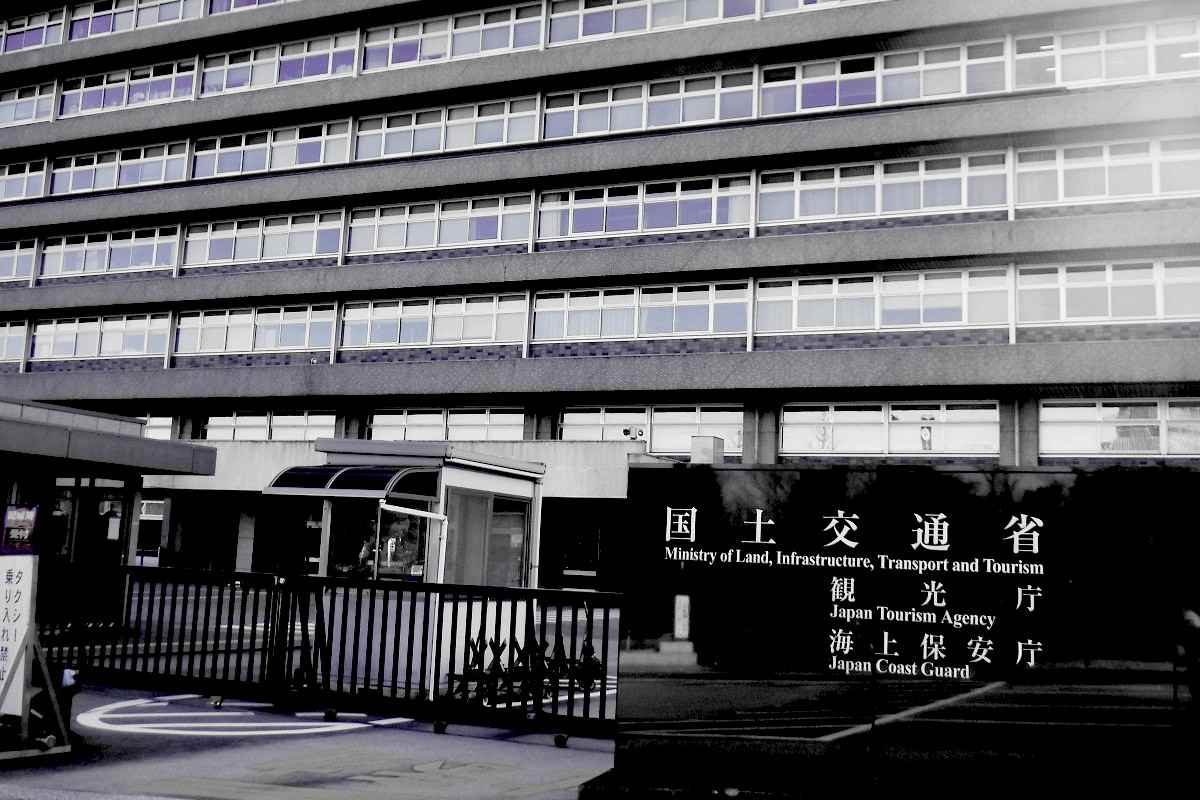Museum in Japan Touts Itself as Base for Search for UFOs; Cosmo Isle Hakui Exhibits Authentic Space Exploration Items

Jomei Takano looks up at the sky at the Cosmo Isle Hakui Space and UFOs Museum in Hakui, Ishikawa Prefecture, in July. Behind him to the right is an actual rocket purchased from NASA.
13:01 JST, August 16, 2024
HAKUI, Ishikawa — This year has seen an abundance of positive stories about space, with the landing of the Japan Aerospace Exploration Agency’s lunar probe on the moon and the successful launch of the H2A rocket.
Back on Earth, the Cosmo Isle Hakui space and science museum in Hakui, Ishikawa Prefecture, provides a unique experience of the mysteries and fascination of space.
The museum’s founding stems from one man’s fascination with rumors of possible UFO activity, and has become a “base” of operations for UFO enthusiasts, a movement the city relishes as a way to revitalize its economy.
It was back in 1984 that Josen Takano read something in a local reference material that caught his eye. “As the autumn sun sets and it grows dark, a mysterious fire gradually moves from east to west on the side of the mountain in the west,” it read, referring to Mt. Bijo.
Takano, now 68, was a Hakui native who had just moved back to his hometown and begun working as a temporary city employee. He wondered, could the “mysterious fire” be a UFO?
He found a number of sympathizers, and the idea was born of revitalizing the city under the theme of UFOs and other space-related topics. The city took it seriously and got on board, and Hakui gradually became known as the “city of UFOs.”
In 1990, the city hosted an “international symposium” on space and UFOs, inviting former astronauts from the United States and the then Soviet Union. The event was well-attended, drawing about 45,000 people over nine days.
In 1996, the Cosmo Isle Hakui opened its doors as the de facto base of operations.
Realistically speaking, the museum has no UFO exhibits. But it does have on display actual items from space vehicles made by NASA and the Soviet Union. There also are models, but Takano has been stringent on ensuring that everything on display is “authentic.”
Although the museum receives subsidies from the central government, it lacks the funds to obtain real items. But Takano took it upon himself to visit NASA and succeeded in persuading the U.S. space organization to loan the museum a prototype Mars exploration vehicle for free for 100 years.
He also got a good price on the purchase of a rocket launched as part of Project Mercury, the U.S. manned spaceflight program that ran from 1958 to 1963. The main body of the rocket, which is made of a magnesium alloy, remains almost fully rust-free to this day.
Takano also took a shot and contacted the Russian space agency. That resulted in the acquisition of a rocket that is said to have been launched in the 1970s by the former Soviet Union and orbited the Earth for seven days.
To confirm the authenticity of the spacecraft, Takano examined it with NASA officials and others whom he had become close to during the negotiations for the Mars vehicle.
The surface of the Soviet-made rocket shows scorch marks and cracks believed to have been made during reentry into the atmosphere.
Thanks to Takano’s commitment to authenticity, “Many visitors come in thinking it’s a novelty, but they leave amazed,” said his son Jomei, 35, who works at the museum. “I want them to experience the texture and atmosphere that only real things can convey.”
The museum, located at the base of the Noto Peninsula, was forced to close for about a month after the major earthquake that hit the area in January caused various damage, including causing wires securing valuable exhibits to snap.
In the six months or so since its reopening, visitor numbers have been only about a quarter of those in the same period last year.
During the difficult days, Jomei Takano said he would occasionally look up at the sky, as someone with their head down cannot find a UFO. “My heart feels lighter looking for UFOs and thinking about the universe,” he said.
The museum is a short walk from JR Hakui Station. The streets nearby are filled with illustrations of UFOs and aliens, and there is also a UFO sculpture placed by local residents.
UFO village in Fukushima
The UFO craze is alive in well in other parts of Japan.
The Iino district in Fukushima City touts itself the “home of UFOs” because of the many UFO sightings that have been reported there from long ago.
The UFO Fureai-kan hall displays “classified documents” from the U.S. Central Intelligence Agency and sculptures of aliens among its exhibits.
To boost the local economy, local volunteers established an entity dedicated to the research of unidentified flying objects, called the International UFO Lab, within the UFO Fureai-kan in 2021.

Large garlic bulbs in the shape of UFOs
To date, the lab has analyzed more than 1,000 reported UFO sightings both at home and abroad, and announced that 12 photographs or videos are “highly likely to depict UFOs.”
There are a number of ongoing UFO-themed projects in the district, such as the production of large garlic bulbs in the shape of UFOs and a plan to brew nigorizake (unrefined sake) in the image of the galaxy from locally grown rice for sake.
“UFOs have many devoted fans,” said Takeshi Okamoto, a professor of tourism at Kindai University. “It is an area in which a little innovation can have great impact as a tourism resource.”
Top Articles in Society
-

Producer Behind Pop Group XG Arrested for Cocaine Possession
-

Man Infected with Measles Reportedly Dined at Restaurant in Tokyo Station
-

Man Infected with Measles May Have Come in Contact with Many People in Tokyo, Went to Store, Restaurant Around When Symptoms Emerged
-

Woman with Measles Visited Hospital in Tokyo Multiple Times Before Being Diagnosed with Disease
-

Australian Woman Dies After Mishap on Ski Lift in Nagano Prefecture
JN ACCESS RANKING
-

Producer Behind Pop Group XG Arrested for Cocaine Possession
-

Japan PM Takaichi’s Cabinet Resigns en Masse
-

Man Infected with Measles Reportedly Dined at Restaurant in Tokyo Station
-

Israeli Ambassador to Japan Speaks about Japan’s Role in the Reconstruction of Gaza
-

Videos Plagiarized, Reposted with False Subtitles Claiming ‘Ryukyu Belongs to China’; Anti-China False Information Also Posted in Japan
























